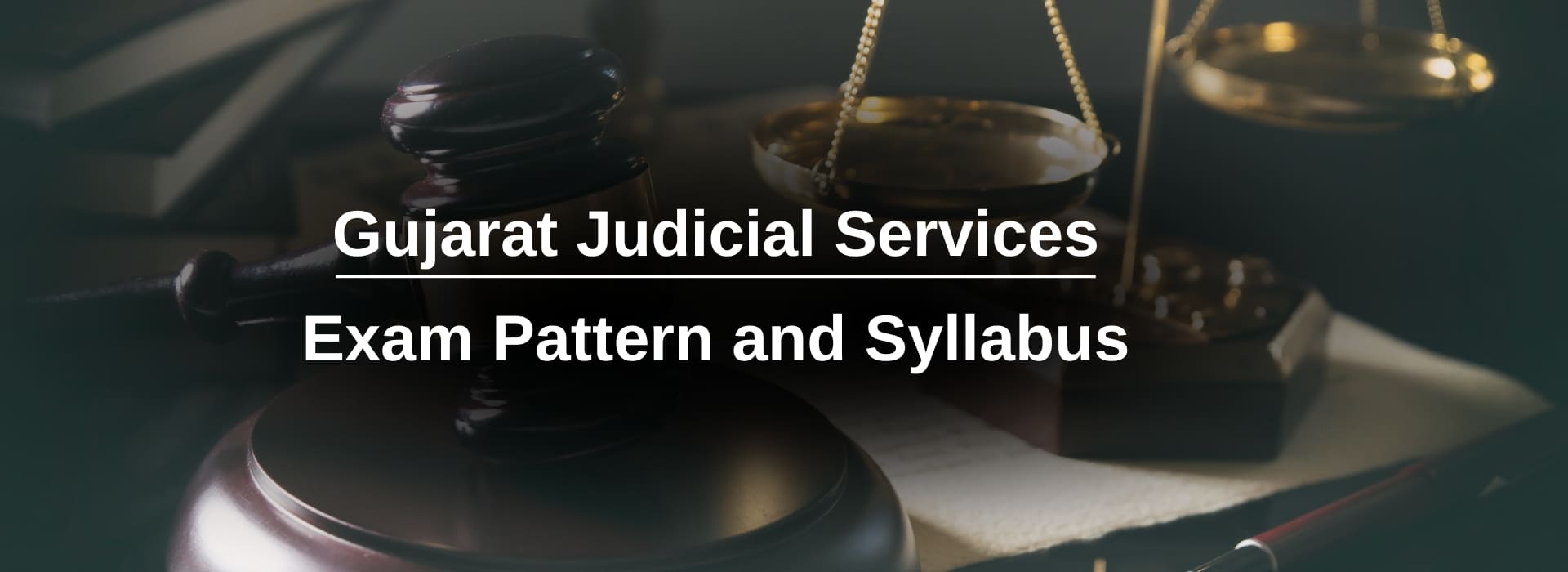
Gujarat Judicial Services Exam 2025: Overview & Details
The Gujarat Judicial Services Exam 2025, held by the Gujarat High Court, is a great opportunity for those who want to become Civil Judges in Gujarat. The exam process includes three stages: the Preliminary Exam, Main Exam, and Interview. If you're aiming for a career in the judiciary and meet the eligibility criteria, it's time to start preparing.
This article explains the exam pattern for the Prelims, Mains, and Interview, along with tips to help you succeed in each stage.
Gujarat Judiciary Exam Pattern 2025
The Gujarat Judiciary Exam consists of three stages:
- Preliminary Exam (Objective Type)
- Main Exam (Descriptive Type)
- Interview
You need to pass all three stages to qualify for a Civil Judge role.
Preliminary Exam Pattern
The Prelims is the first stage, and it is designed to filter out candidates who are ready for the Main Exam. It tests your basic knowledge of law and your understanding of Gujarati.
Important Details of the Prelims Exam:
- Question Type: Multiple-choice questions (MCQs)
- Scoring: Each correct answer gets 1 mark. If you're wrong, you lose 0.33 marks.
- Total Questions and Duration:
- Paper 1: 100 questions on law (2 hours)
- Paper 2: 50 questions on Gujarati language (30 minutes)
- Qualifying Marks: You need at least 50% to move on to the Main Exam.
Subjects Covered:
- Indian Penal Code (IPC)
- Code of Criminal Procedure (CrPC)
- Indian Evidence Act
- Constitution of India
- Specific Relief Act
- Transfer of Property Act
- Gujarat Prohibition Act
- And other important laws
Preparation Tips for Prelims:
- Focus on the Gujarat Judiciary syllabus, especially on key laws like IPC, CrPC, and CPC.
- Regularly practice MCQs to improve speed and accuracy.
- Don't ignore the Gujarati paper, as it's essential to pass.
Main Exam Pattern
The Main Exam is more in-depth and tests your knowledge of the law with descriptive (written) questions. It evaluates how well you can analyze and present legal arguments.
Key Details of the Main Exam:
- Number of Papers:
- Paper 1: Criminal Law
- Paper 2: Civil Law
- Marks and Duration: Each paper is worth 100 marks and lasts for 3 hours.
- Language Options: You can write the exam in either English or Gujarati.
- Qualifying Marks: You need to score at least 50% in each paper to move to the Interview.
Subjects Covered:
- Criminal Law Paper: CrPC, IPC, Indian Evidence Act, Juvenile Justice Act, Negotiable Instruments Act
- Civil Law Paper: CPC, Indian Contract Act, Transfer of Property Act, Arbitration Act, Succession Laws
Preparation Tips for Mains:
- Thoroughly go through the syllabus and focus on case laws and their applications.
- Practice answer writing with a structured approach: Introduction, Legal Provisions, Analysis, Conclusion.
- Solve past year papers to get used to the format.
Interview Pattern
The Interview is the final stage of the Gujarat Judiciary Exam. It’s a chance to assess your personality, communication skills, and legal knowledge.
Key Details of the Interview:
- Marks Allotted: 50 marks
- What’s Assessed:
- Your legal knowledge and ability to interpret the law
- Mental alertness and balanced judgment
- Communication skills and overall personality
- Qualifying Marks: You need to score at least 40% to pass the Interview.
Preparation Tips for the Interview:
- Go over your notes from the syllabus and stay updated with current legal developments.
- Practice mock interviews to improve confidence and communication.
- Stay current on recent legal judgments and changes in the law.
Gujarat Judiciary Exam Syllabus 2025: A Quick Overview
To do well in the Gujarat Judiciary Exam, it’s important to understand the syllabus for both the Prelims and Main Exams. Here's a breakdown:
Preliminary Exam Syllabus:
- Part A: Criminal Laws (IPC, CrPC, Evidence Act, etc.)
- Part B: Civil Laws (CPC, Contract Act, TPA, Constitution, etc.)
- Part C: General Knowledge, English, Gujarati Language, Reasoning
Main Exam Syllabus:
- Paper 1 – Criminal Law: CrPC, IPC, Evidence Act, Juvenile Justice Act, etc.
- Paper 2 – Civil Law: CPC, Indian Contract Act, Specific Relief Act, Transfer of Property Act, Constitution of India
Exam Pattern Comparison: Prelims, Mains, and Interview
| Aspect | Preliminary Exam | Main Exam | Interview |
|---|---|---|---|
| Type | Objective (MCQs) | Descriptive | Interview |
| Papers | Two (Law & Gujarati Language) | Two (Criminal Law & Civil Law) | N/A |
| Duration | 2 hours + 30 minutes | 3 hours per paper | N/A |
| Marks | 150 | 200 | 50 |
| Qualifying Marks | 50% | 50% | 40% |
Preparation Tips for Gujarat Judiciary 2025
- Start Early: Begin at least a year ahead to give yourself enough time to cover the syllabus and revise.
- Focus on Core Subjects: Prioritize key topics like CPC, CrPC, IPC, and the Constitution of India.
- Practice Mock Tests: Take regular mock tests to improve your accuracy and manage your time well.
- Create Notes: Keep concise notes for quick revision before exams.
- Attend Mock Interviews: Practice interviews to build confidence and improve your communication skills.
Conclusion
The Gujarat Judicial Services Exam 2025 is a great opportunity for anyone looking to become a Civil Judge in Gujarat. With a structured preparation plan, a solid understanding of the syllabus, and consistent practice, you can do well in this exam.
Make sure you fully understand the exam pattern and syllabus, practice regularly, and stay dedicated to your preparation. With the right approach, clearing the Gujarat Judiciary Exam 2025 is within your reach.
Good luck!